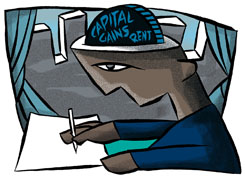Can I use LTCG to finance my apartment and still claim tax benefits in FY24-25?
Samkit Maniar | Answer |Ask -Follow
Tax Expert - Answered on Jul 24, 2024
He has graduated from Mumbai’s N M College of Commerce and Economics and has completed his CA from The Institute of Chartered Accountants of India."... more

Hi Sir, Could you help me to understand, If below scenario is valid to get tax benefit. Please read all below four points before answering questions. Point1: Sale agreement date of apartment = Jan 2023. Point2: 60 percent of apartment cost(with self + home loan) paid to builder till now (July 2024). Point3: Suppose, I sold stocks(Sept 2024) and invested LTGC to finance remaining 40 percent of apartment cost through instalments (before this FY end Mar 2025). Point4: Expected possession date of apartment = Oct 2025 (Actual home registration date). Question1. Am I eligible to claim this LTCG tax benefit under section 54F in above scenario for FY24 -25? Question2. If I am eligible for LTCG tax benefit , Do we need to put LTGC amount in capital gain account till possession of property? Or capital gain account is not needed , as LTGC amount is already invested to finance the remaining 40 percent of apartment cost in this FY24 -25 ? Question3: If I am eligible for LTCG tax benefit , Can I use LTCG amount for prepayment of home loan in this FY24 -25 and get Section 54F tax benefit ? Questions4: If only option remain is to save in capital gain account for tax benefit in FY24 -25. I really want to avoid to save LTCG in capital gain account. In this case, Suppose, I sold stocks(After current FY e.g. Apr 2025) and use LTCG amount for prepayment of home loan. Can I get tax benefit in this case for F**Y25 -26(**Assuming possession date of apartment = Oct 2025)
As far as eligibility of section LTCG benefit is concerned, it is available for purchase of house 1 year prior to transfer of long term assets (i.e. stocks and shares in this case) or 2 years after the transfer of long term assets. Assumingly, you sold the shares in September 2024 then ideally you can utilize the entire proceeds for purchasing the house property from September 2023 till September 2026. However, the property is registered as on January 2023, hence it may be difficult for you to claim the LTCG exemption.
Accordingly, post payment of 10% taxation over gains, you can prepay your home loan.
Please consult your CA before moving ahead.
You may like to see similar questions and answers below
T S Khurana |558 Answers |Ask -Follow
Tax Expert - Answered on Aug 06, 2024
Mihir Tanna |1101 Answers |Ask -Follow
Tax Expert - Answered on Jul 24, 2024
T S Khurana |558 Answers |Ask -Follow
Tax Expert - Answered on Aug 16, 2024
T S Khurana |558 Answers |Ask -Follow
Tax Expert - Answered on Feb 28, 2026
T S Khurana |558 Answers |Ask -Follow
Tax Expert - Answered on Feb 28, 2026
T S Khurana |558 Answers |Ask -Follow
Tax Expert - Answered on Feb 28, 2026
Nayagam P P |10926 Answers |Ask -Follow
Career Counsellor - Answered on Feb 27, 2026
Ramalingam Kalirajan |11045 Answers |Ask -Follow
Mutual Funds, Financial Planning Expert - Answered on Feb 27, 2026
Mayank Chandel |2628 Answers |Ask -Follow
IIT-JEE, NEET-UG, SAT, CLAT, CA, CS Exam Expert - Answered on Feb 27, 2026
Pankaj Vyavahare |15 Answers |Ask -Follow
Career Counsellor, Life Coach - Answered on Feb 26, 2026
Pankaj Vyavahare |15 Answers |Ask -Follow
Career Counsellor, Life Coach - Answered on Feb 26, 2026
Dr Dipankar Dutta |1856 Answers |Ask -Follow
Tech Careers and Skill Development Expert - Answered on Feb 26, 2026
Ramalingam Kalirajan |11045 Answers |Ask -Follow
Mutual Funds, Financial Planning Expert - Answered on Feb 26, 2026

























